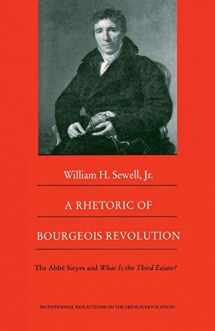
A Rhetoric of Bourgeois Revolution: The Abbe Sieyes and What is the Third Estate? (Bicentennial Reflections on the French Revolution)
ISBN-13:
9780822315384
ISBN-10:
0822315386
Author:
William H. Sewell Jr.
Publication date:
1994
Publisher:
Duke University Press Books
Format:
Paperback
248 pages
FREE US shipping
Book details
ISBN-13:
9780822315384
ISBN-10:
0822315386
Author:
William H. Sewell Jr.
Publication date:
1994
Publisher:
Duke University Press Books
Format:
Paperback
248 pages
Summary
A Rhetoric of Bourgeois Revolution: The Abbe Sieyes and What is the Third Estate? (Bicentennial Reflections on the French Revolution) (ISBN-13: 9780822315384 and ISBN-10: 0822315386), written by authors
William H. Sewell Jr., was published by Duke University Press Books in 1994.
With an overall rating of 3.7 stars, it's a notable title among other
books. You can easily purchase or rent A Rhetoric of Bourgeois Revolution: The Abbe Sieyes and What is the Third Estate? (Bicentennial Reflections on the French Revolution) (Paperback) from BooksRun,
along with many other new and used
books
and textbooks.
And, if you're looking to sell your copy, our current buyback offer is $0.3.
Description
What Is the Third Estate? was the most influential pamphlet of 1789. It did much to set the French Revolution on a radically democratic course. It also launched its author, the Abbé Sieyes, on a remarkable political career that spanned the entire revolutionary decade. Sieyes both opened the revolution by authoring the National Assembly’s declaration of sovereignty in June of 1789 and closed it in 1799 by engineering Napoleon Bonaparte’s coup d’état.
This book studies the powerful rhetoric of the great pamphlet and the brilliant but enigmatic thought of its author. William H. Sewell’s insightful analysis reveals the fundamental role played by the new discourse of political economy in Sieyes’s thought and uncovers the strategies by which this gifted rhetorician gained the assent of his intended readers—educated and prosperous bourgeois who felt excluded by the nobility in the hierarchical social order of the old regime. He also probes the contradictions and incoherencies of the pamphlet’s highly polished text to reveal fissures that reach to the core of Sieyes’s thought—and to the core of the revolutionary project itself.
Combining techniques of intellectual history and literary analysis with a deep understanding of French social and political history, Sewell not only fashions an illuminating portrait of a crucial political document, but outlines a fresh perspective on the history of revolutionary political culture.
This book studies the powerful rhetoric of the great pamphlet and the brilliant but enigmatic thought of its author. William H. Sewell’s insightful analysis reveals the fundamental role played by the new discourse of political economy in Sieyes’s thought and uncovers the strategies by which this gifted rhetorician gained the assent of his intended readers—educated and prosperous bourgeois who felt excluded by the nobility in the hierarchical social order of the old regime. He also probes the contradictions and incoherencies of the pamphlet’s highly polished text to reveal fissures that reach to the core of Sieyes’s thought—and to the core of the revolutionary project itself.
Combining techniques of intellectual history and literary analysis with a deep understanding of French social and political history, Sewell not only fashions an illuminating portrait of a crucial political document, but outlines a fresh perspective on the history of revolutionary political culture.


We would LOVE it if you could help us and other readers by reviewing the book
Book review

Congratulations! We have received your book review.
{user}
{createdAt}
by {truncated_author}



